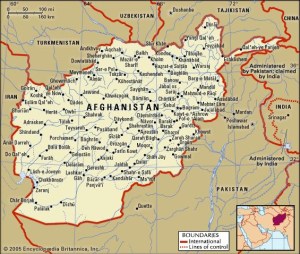Central Asian States Create New C5+1 Consulting Group
 The Central Asian states of Iran, Turkmenistan, Uzbekistan, Tajikistan, and Pakistan have grouped together with Afghanistan in what is known as the 5+1. These countries all share borders with Afghanistan, and effectively encircle the country. The initiative was announced at the meeting of foreign ministers of Central Asia and Afghanistan at their meeting this week in Ashgabat, and is designed to become an effective platform for discussion of the regional issues and development of joint measures for peace provision and sustainable development under UN support.
The Central Asian states of Iran, Turkmenistan, Uzbekistan, Tajikistan, and Pakistan have grouped together with Afghanistan in what is known as the 5+1. These countries all share borders with Afghanistan, and effectively encircle the country. The initiative was announced at the meeting of foreign ministers of Central Asia and Afghanistan at their meeting this week in Ashgabat, and is designed to become an effective platform for discussion of the regional issues and development of joint measures for peace provision and sustainable development under UN support.
We can look at the regional dynamics as follows:
| Country | GDP (US$) | Population (millions) | GDP growth rate |
|---|---|---|---|
| Afghanistan | 68 billion | 36.3 | 2% |
| Iran | 1.53 trillion | 82 | 13.4% |
| Pakistan | 284 billion | 208 | 5.3% |
| Tajikistan | 7 billion | 9 | 6% |
| Turkmenistan | 40 billion | 5.8 | 7% |
| Uzbekistan | 67 billion | 32.5 | 5.3% |
Much of the C5+1 efforts will be to contain terrorism and to help introduce stability, infrastructure, and supply chains into Afghanistan. The country is still heavily dependent upon aid and imports; getting the nation productive is a positive for all the countries concerned in addition to nearby giants of China and India.
The C5+1 announced in Ashgabat is a separate grouping from the US led C5+1, which groups the same five Central Asian countries with the United States. However, the new grouping is likely to follow similar goals, albeit with concentration on Afghanistan. These can be expected to include:
- Counter terrorism;
- Business competitiveness;
- Transport corridor development;
- Power infrastructure; and,
- Climate change adaptation.
China will be highly interested in the C5+1 – it is already providing funding to the Lapis Lazuli Transport Corridor, which connects Afghanistan’s limited rail network through to Iran and onto Turkey and Georgia.
About Us
Silk Road Briefing is produced and written by Dezan Shira & Associates. The firm provides governments and corporate businesses worldwide with strategic, legal, tax and operational advisory services to their SMEs and MNCs investing throughout Eurasia and has 28 offices across China, India, Russia and the ASEAN nations, and partner firms in Central Asia. We have specific and long term experience in China and the OBOR countries. For assistance with OBOR related issues, please contact the firm at silkroad@dezshira.com or visit the practice at www.dezshira.com
 Related Reading:
Related Reading:
![]() Iran Completes First Phase Of Chabahar Port & International North-South Transport Corridor
Iran Completes First Phase Of Chabahar Port & International North-South Transport Corridor
![]() China, Pakistan Bypass India as CPEC Digital Routes are Developed
China, Pakistan Bypass India as CPEC Digital Routes are Developed
![]() Uzbekistan Completes High Speed Bukhara-Misken Rail Link
Uzbekistan Completes High Speed Bukhara-Misken Rail Link
![]() Turkmenistan’s OBOR Contributions – Gas, Tourism & Light Trade Potential
Turkmenistan’s OBOR Contributions – Gas, Tourism & Light Trade Potential
Silk Road and OBOR Business Intelligence
Dezan Shira & Associates´ Silk Road and OBOR investment brochure offers an introduction to the region and an overview of the services provided by the firm. It is Dezan Shira´s mission to guide investors through the Silk Road´s complex regulatory environment and assist with all aspects of establishing, maintaining and growing business operations in the region.
China’s New Economic Silk Road
This unique and currently only available study into the proposed Silk Road Economic Belt examines the institutional, financial and infrastructure projects that are currently underway and in the planning stage across the entire region. Covering over 60 countries, this book explores the regional reforms, potential problems, opportunities and longer term impact that the Silk Road will have upon Asia, Africa, the Middle East, Europe and the United States.







